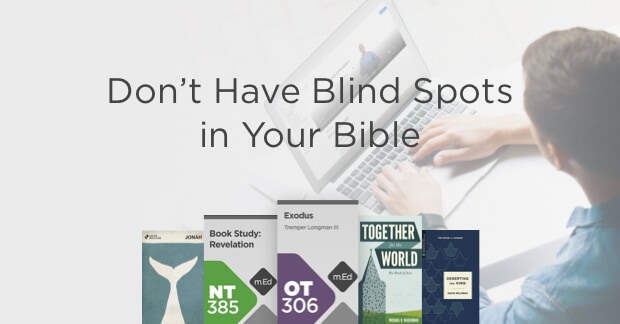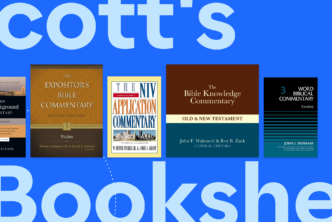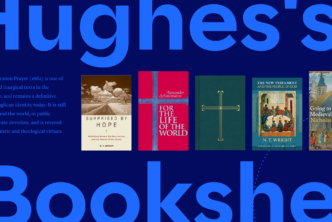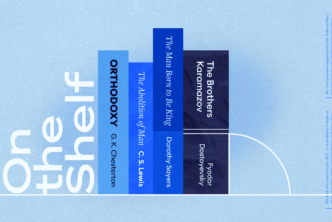When we decided to curate a list of resources for every book of the Bible, one of our priorities was to choose resources that would help people comprehend the most difficult books of the Bible.
All Scripture is God-breathed and profitable for helping Christians mature and better obey God (2 Tim 3:16–17), so we should study all of it.
Here are five books of the Bible that might stump you on an initial read, with keys to help you unlock the book, plus resources for going deeper.
Ecclesiastes
Read Ecclesiastes 1 and you’ll likely be scratching your head. Everything is meaningless? Then what am I reading this book for?
Ecclesiastes is a masterful work of wisdom literature. The author—whom many believe to be King Solomon, though this remains unsettled—reflects on the nature of life “under the sun,” that is, in the fallen world.
And it gets bleak. The futility of life is real, and the author of Ecclesiastes takes it seriously.
Occasionally the clouds break and he finds meaning in light of God’s rule, which is the ultimate point of Ecclesiastes: life without God is ultimately meaningless. Read it with the willingness to live with questions and you’ll be ready to receive its answers.
Browse resources on the book of Ecclesiastes.
Isaiah
Isaiah is another head-scratcher. A book of visions, judgments, and prophecies, it swings back and forth from terror to triumph. But if you work to see how it all relates, you get some of the Bible’s most beautiful pictures of God’s judgment, mercy, and faithfulness.
On a basic level, the book’s theme is God’s judgment upon—but ultimate restoration of—Judah and Israel, his covenant people. Though Jesus is not mentioned in the book of Isaiah, it is widely accepted that he fulfills the prophecies concerning the suffering Servant-Messiah who appears throughout chapters 40–55.
On either side of chapters 40–55 are the book’s other major sections: judgments upon God’s people and other nations (1–39) and future deliverance for God’s people (56–61).
Browse resources on the book of Isaiah.
Deuteronomy
This excerpt from the Faithlife Study Bible succinctly offers the major keys for understanding the book of Deuteronomy:
The title “Deuteronomy” means “second law.” The book reiterates the law and the events recorded in Exodus, Leviticus, and Numbers. It also establishes a framework for viewing this history: If the Israelites are faithful to God’s covenant, they will have peace and receive blessings from Yahweh, but if they turn away, they will experience curses of war, famine, and death—all of which are meant to prompt them to stay faithful. This framework is applied to subsequent books that narrate Israel’s later history (Joshua, Judges, 1–2 Samuel, 1–2 Kings).
Thus, Deuteronomy serves as a bridge between the Pentateuch (the first five books of the Old Testament) and the rest of Old Testament history. It is critical for an understanding of the whole Old Testament.
Browse resources on the book of Deuteronomy.
Ezekiel
Ezekiel is a difficult book to interpret even for seasoned Bible readers. A work of apocalyptic literature, it features strange visions and oracles that can be hard to decipher.
That said, knowing the book’s historical setting helps make sense of it. Ezekiel aligns with the events and visions described in the book of Daniel, which is why the two often go together. Ezekiel prophesied during the Babylonian exile when God’s people were taken into captivity by the Babylonian exile because of their continued disobedience.
The book is full of heartbreaking passages, such as when Ezekiel describes God’s glory departing from the Temple (Ezek 8–11)—God’s chief act of judgment. That said, there are glimmers of hope in the book, like the famous Valley of Dry Bones passage (Ezek 37).
Browse resources on the book of Ezekiel.
Revelation
The book of Revelation is the Ezekiel of the New Testament, in terms of having a reputation for being the hardest to understand.
But with a proper grasp of how the genre (apocalyptic literature) functions, one can work through the book to discover incredible truths.
For example, occasionally John’s visions—Revelation is a letter describing visions and prophecies John received from God while in exile—conflate two seemingly opposite things into one. This feature of apocalyptic literature is meant to cause the reader to take a second look and understand.
Consider Revelation 5:5–6:
And one of the elders said to me, “Weep no more; behold, the Lion of the tribe of Judah, the Root of David, has conquered, so that he can open the scroll and its seven seals.” And between the throne and the four living creatures and among the elders I saw a Lamb standing, as though it had been slain, with seven horns and with seven eyes, which are the seven spirits of God sent out into all the earth.
The elder announces a victorious lion, but John turns to see a slain lamb. The original hearers would have instantly known: this is a vision of Jesus, the Messiah who ascended the throne through his suffering.
The more you read Revelation, the more the theme of Jesus’ ultimate victory emerges, a comfort to the persecuted churches who received John’s letter (Rev 1:4).
Browse resources on the book of Revelation.
More help for other difficult books of the Bible
The Bible, while its general meaning is clear, is not an easy book to read. It’s rooted in an ancient context and employs several genres, which means you must understand the rules of each genre to comprehend the meaning of all the books.
Chances are when you open your Bible, there are certain books you avoid because they seem beyond you. And they may be, but the right resources can change that. Whether it’s the laws of Leviticus or the visions of Revelation, you can move from confusion to clarity with a little help from gifted scholars.
***





